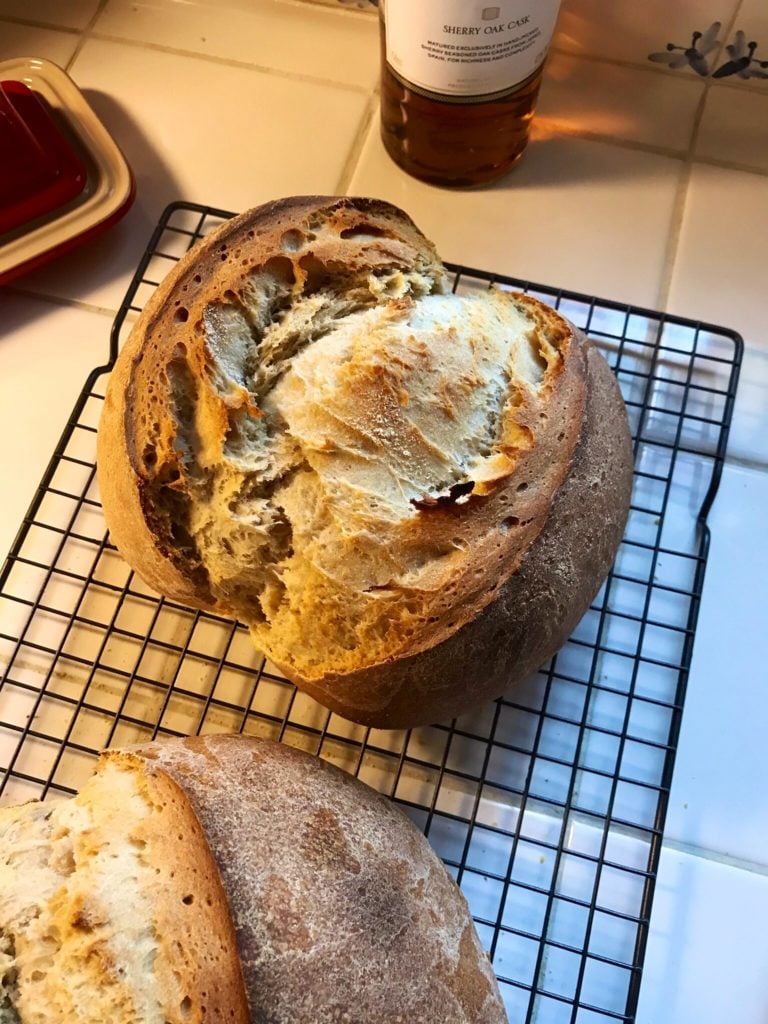Art World
Sourdough Enthusiasts Are Harvesting 4,500-Year-Old Yeast From Museums’ Egyptian Pottery to Make Bread Fit for the Pharaohs
The samples came from the Museum of Fine Arts Boston and the Peabody Essex Museum.

The samples came from the Museum of Fine Arts Boston and the Peabody Essex Museum.

Sarah Cascone

A scientist, an Egyptologist, and a video-game designer are teaming up to unveil the culinary secrets of ancient Egypt by extracting traces of 4,500-year-old yeast from ancient pottery and using it to bake bread. And the results look surprisingly appetizing.
Seamus Blackley, who created the Xbox, has already made his first loaf of bread using what he believes to be the ancient micro-organisms. “The crumb is light and airy,” he wrote on Twitter. “The aroma and flavor are incredible. I’m emotional.”
Blackley began baking sourdough bread a few years ago, and was intrigued to learn that it is the world’s oldest form of bread making. A self-described Egyptology hobbyist, Blackley is now hoping to replicate ancient Egyptian baking techniques with the very yeast cultures that would have been used five millennia ago.
To do it, he teamed up with University of Iowa biologist Richard Bowman and University of Queensland Egyptologist Serena Love, who took samples from objects in the collections of the Museum of Fine Arts Boston and the Peabody Museum of Archaeology and Ethnology at Harvard University in Cambridge, Massachusetts, that would have been used to make bread and beer in ancient times.
Using a nondestructive process and careful sterile technique, we believe we can actually capture dormant yeasts and bacteria from inside the ceramic pores of ancient pots. We sampled beer- and bread-making objects which had actually been in regular use in the Old Kingdom. pic.twitter.com/9FahMRjJBU
— Seamus Blackley (@SeamusBlackley) August 5, 2019
Bowman believes he can capture dormant yeast particles that are hibernating in the porous clay surfaces and bring them back to life using a non-invasive sampling technique. “You pump a fluid in carefully with a syringe and some sterile cotton in contact with the ceramics. It soaks in and you vacuum it back out,” he told the London Times.
The plan is to take additional samples over the course of the next year, building up a library that will allow them to distinguish between ancient microorganisms and modern contaminants. Bowman and Blackley plan to write a paper on their efforts to recreate ancient Egyptian bread and beer.
Blackley sent the first batch of samples to Bowman for testing, but couldn’t resist saving one for himself, feeding the yeast sterilized grain and tending to it for a week to create a viable starter. The lab still “needs to isolate and characterize the samples before we know for sure this is real,” he said, but the successful experiment bodes well for the project’s long-term prospects.
Finally, I need to say again, this was just for practice. @rbowman1234 needs to isolate and characterize the samples before we know for sure this is real. @drserenalove and I need to teach ourselves to actually bake like Egyptians. BUT ITS NOT A BAD START! Good Night! pic.twitter.com/ZkgeTqvloC
— Seamus Blackley (@SeamusBlackley) August 5, 2019
To make his dough, Blackley used water and unfiltered olive oil with freshly milled organic barley, Einkorn, and Kamut—ancient grains that would have been available to the bakers of Egypt’s Middle Kingdom. “Modern wheat was invented long after these organisms went to sleep,” he said. “The idea is to make a dough with identical ingredients to what the yeast ate 4,500 years ago.”
For his first try, however, Blackley otherwise stuck to contemporary baking techniques. With Love’s help, he plans to identify and implement the methods that would have been used in ancient Egyptian kitchens.
“This is incredibly exciting. I’m so amazed that it worked,” Blackley added. “It’s such a magical thing, to think we can share food in a rather genuine way with our distant ancestors.”
The project follows the example of a similar experiment conducted by Israel’s Antiquities Authority and three Israeli universities that used ancient yeast to create a wheat beer with six-percent alcohol content. “Aside from the gimmick of drinking beer from the time of King Pharaoh, this research is extremely important to the field of experimental archaeology,” Ronen Hazan, a biologist on the project, told the BBC. “By the way, the beer isn’t bad.”